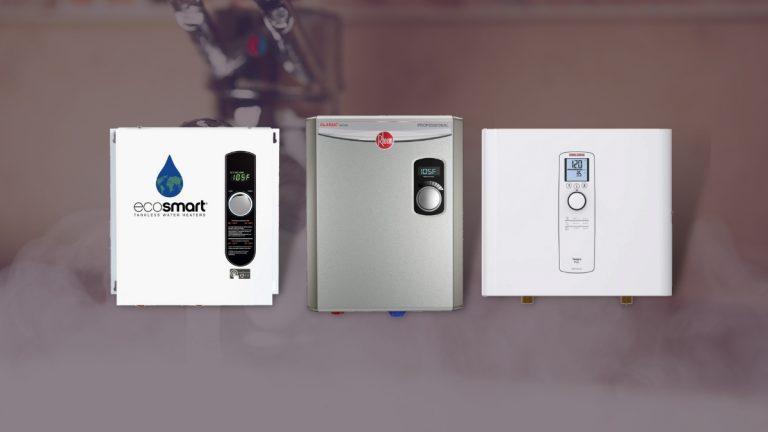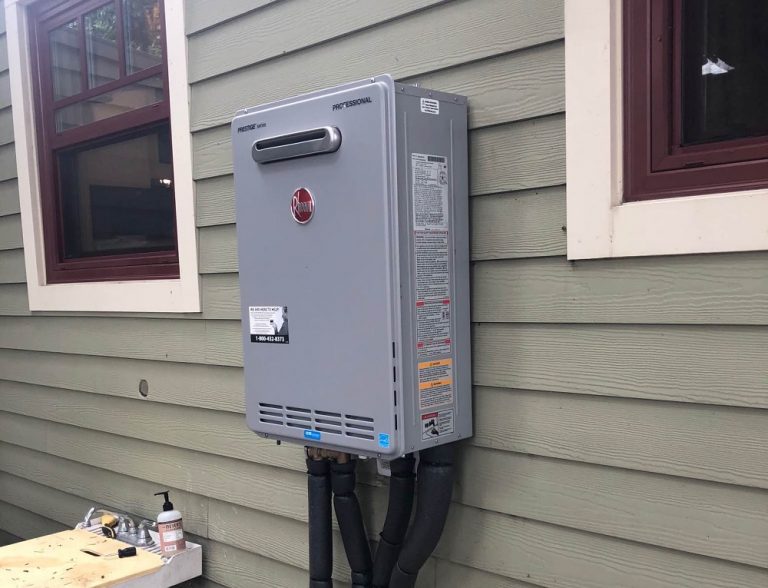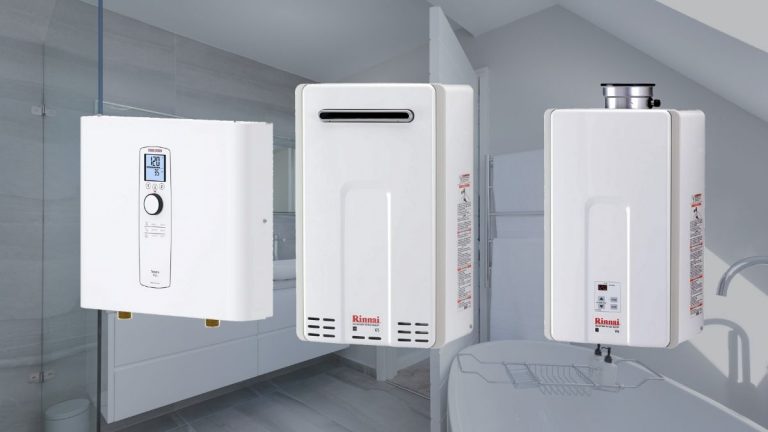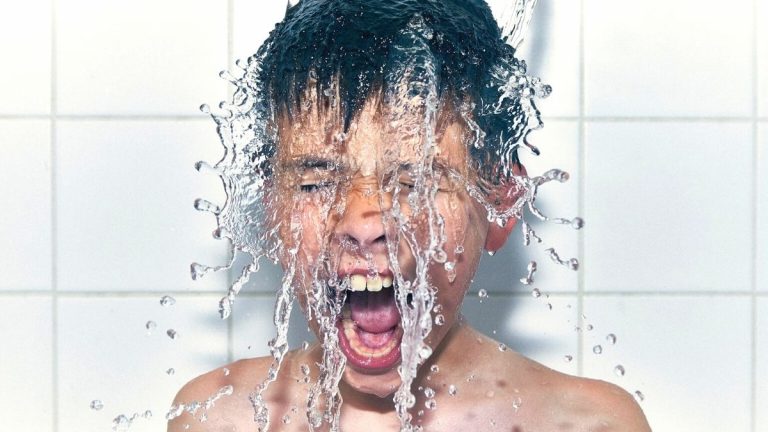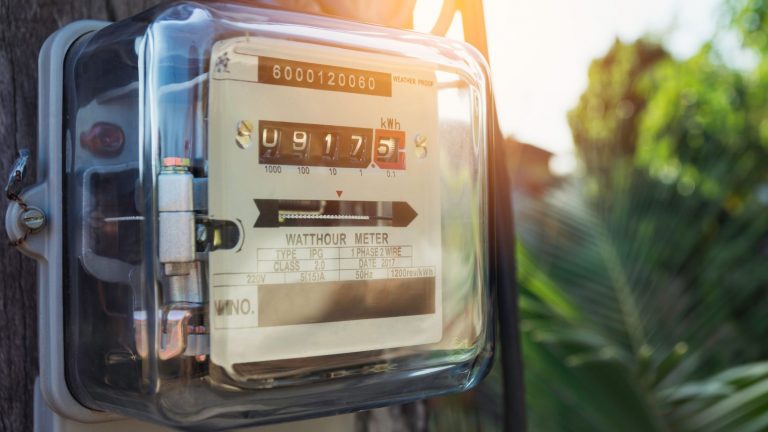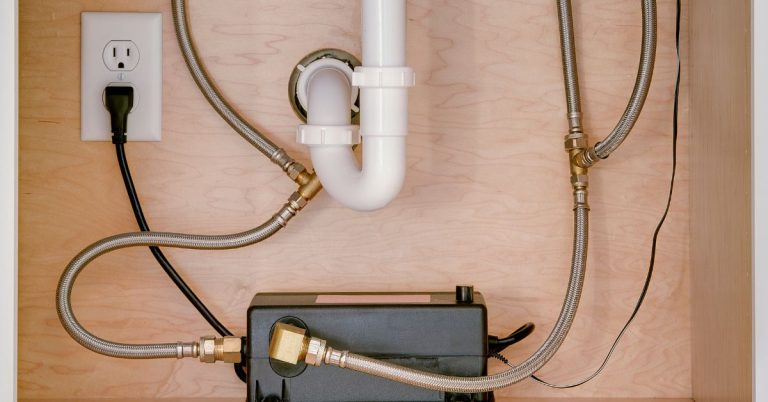6 Best Non-Condensing Tankless Water Heaters in 2023- A Review
Searching for the best non-condensing tankless water heater? I have got you covered, keep reading.
Let’s be honest, condensing tankless water heaters are great. They are more energy-efficient and don’t require expensive steel venting systems. But they are pretty expensive and can cost twice the price of a non-condensing model. So if you are on a budget then a non-condensing tankless unit is the perfect option for you. These are at least 30% more efficient than tank models.
In the upcoming review, I have tested, analyzed, and reviewed the 6 best non-condensing tankless water heaters that you should select from in 2023. So let’s jump straight into it.
REVIEWS: Best non-condensing tankless water heaters
1. Rinnai V94iN
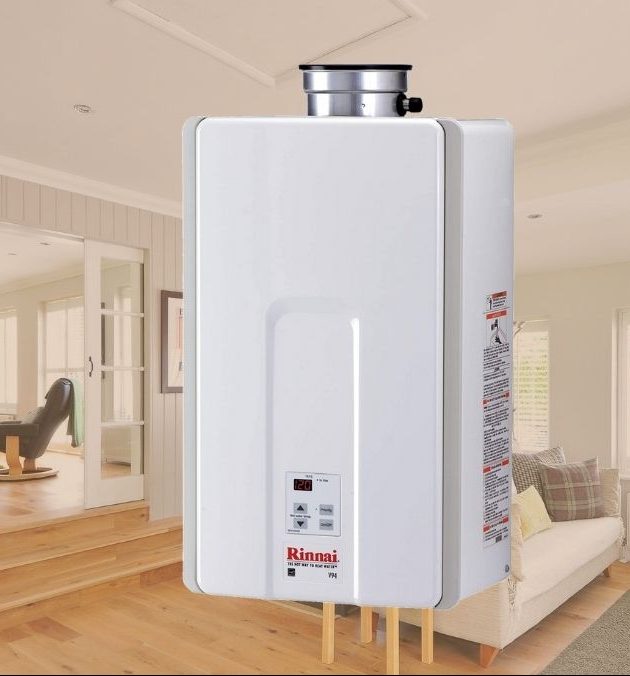
10GPM non-condensing tankless water heater
- Max Flow: 9.8 GPM
- Type: Indoor
- Fuel: Natural gas
- Capacity: 180,000 BTU
The first on the list is the Rinnai V94iN, a non-condensing tankless water heater. It’s so a reliable heater and I am so impressed with it that I have also mentioned it in my top tankless water heater for large homes.
The V94iN offers upto 9.8 GPM of hot water flow in warm climates and as little as 4 GPM in cold climates. You can run upto 5 high-flow fixtures like showers all at the same time without experiencing a low flow or temperature drop issue. The heating capacity of Rinnai maxes out on 180,000 BTUs and can operate on a minimum of 10k BTU input.
I have also noticed that this model comes with scale detection technology which alerts the homeowners when excess scale builds up. The V94iN is an indoor model that comes in natural gas and liquid propane variants. You also get 10 years of warranty on the heat exchanger as long as you regularly maintain the heater.
Pros
- Impressive performance
- Ideal for big households with upto 4 bathrooms.
- Decent 9.8 GPM hot water flow
- Scale detection and alert feature
- Available in natural gas and liquid propane choices.
Cons
- The average energy efficiency of 0.81 UEF
2. Rheem Performance Plus
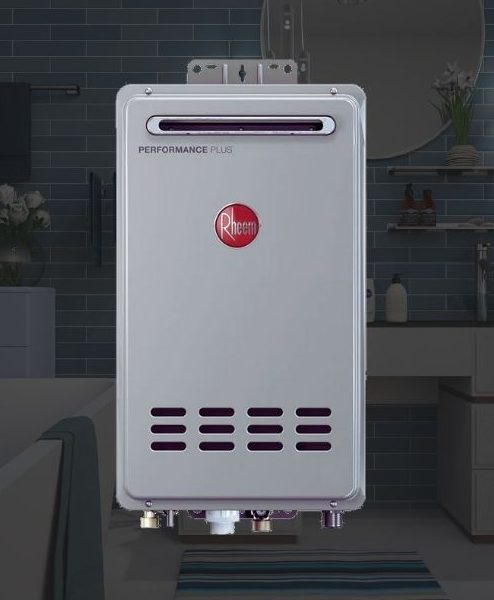
Top-rated water heater with 8.0 GPM output
- Max flow: 8.4 GPM
- Type: Outdoor
- Fuel: Natural Gas/ Liquid Propane
- Capacity: 180,000 BTU
Next up is the Rheem Performance Plus series tankless water heater. The non-condensing model can deliver upto 8.4 GPM hot water that is sufficient to supply more than 3 showers at a time including a sink when the Max temperature rise is 35°F.
It is an outdoor tankless water heater that you can install on the outer wall of your home. It requires no special venting so you save money on that. The heater has its freeze protection to a temperature of upto -30°F. If you live in a region where the temperature drops below that then you will not want to install this unit.
With that said, it has a remote digital thermostat for temperature control and a sophisticated burner that minimizes NOx output and provides you with 12 years of warranty on the heat exchanger.
Pros
- More energy efficient than Rinnai at 0.82UEF
- Ideal for 2-3 bathroom houses
- Can deliver upto 8.4 GPM hot water at 35°F rise
- Freeze protection to upto -30°F
- CSA certified
Cons
- Not ideal for the northern US where the temperature drops below -30°F
- Not for a locality with a high risk of theft
3. Eccotemp 45HI
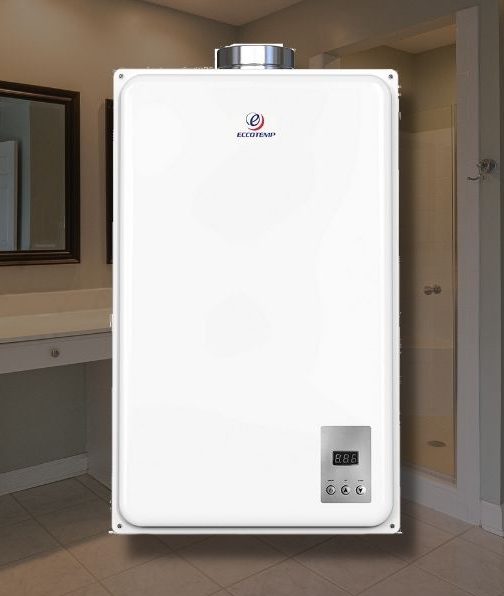
Highlights
- Max flow: 6.8 GPM
- Fuel: Natural Gas/ Liquid Propane
- Type: Indoor
- Input: 140,000 BTU
The 45HI is the largest gas-fired tankless water heater from EccoTemp. This non-condensing model can yield upto 6.8 GPM hot water at a 35°F rise and has a minimum activation flow of 0.8 GPM. Yes, activation flow is on a little higher side here which can result in cold water when the lavatory faucet is used alone.
This indoor model has a complete stainless steel finish with a rustproof design. The company promises a 0.82 energy efficiency factor. 45HI is equipped with its antifreeze system and comes with 10 10-year warranty on the heat exchanger.
Eccotemp is a rather new brand and to expand its reach, they have placed this product in a relatively cheaper price segment. You can bring one home for roughly $600(at the time of reviewing). It is one of the best propane on-demand water heaters that doesn’t break the bank.
Pros
- Comparatively cheap gas water heaters
- Comes in natural gas and liquid propane variant
- Can deliver hot water to upto 2 and a half bathrooms
- Features Anti-freeze protection
Cons
- The temperature consistency is found to be poor
- Also, in my opinion, it has poor reliability
- Doesn’t support a hydronic, or recirculating system
- Doesn’t work at an elevation beyond 3000ft from sea level
4. Rinnai V53De
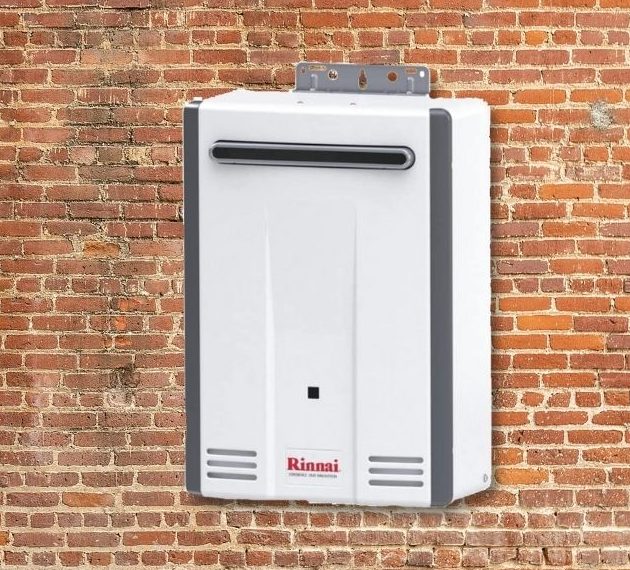
Highlights
- Max flow: 5.3 GPM
- Type: Outdoor
- Fuel: Natural Gas/ Liquid Propane
- Input: 120,000 BTU
With 5.3 GPM max hot water flow at 35°F rise, the Rinnai V53De is a medium-sized non-condensing tankless water heater. In my test, I found that the unit can support upto 2 showers at the same time along with a sink. Speaking of efficiency, the unit has a uniform energy factor of 0.81. The V53De is an outdoor model that saves your indoor space and money on an expensive venting system.
It is available in both natural gas and propane variants so you can select based on whatever fuel is easily available to you.
Since it’s an outdoor unit, the heater comes with a remote digital thermostat that can be installed at the place of your convenience for easy temperature management. Along with that, it shows alerts when the water heater needs flushing and maintenance.
Pros
- Robust build with reliable operation
- The outdoor unit saves space and money on venting
- Enhanced scale detection feature prevents damage to the unit
- Supply hot water to upto 2 bathrooms
Cons
- Energy efficiency is average
- Not ideal for a locality that is vulnerable to theft
5. Fogatti FGD24IN
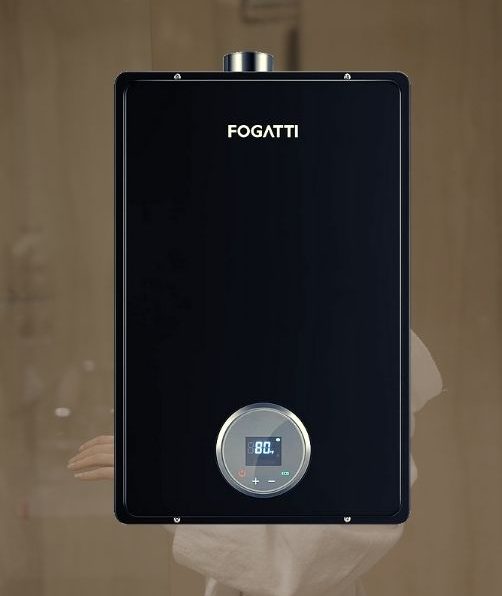
Best budget non-condensing tankless water heater for cold climate
- Max flow: 4.2 GPM
- Type: Indoor
- Fuel: Natural gas/ Liquid Propane
- Input: 170,000 BTU
The Fogatti FGD24IN is a decent non-condensing tankless water heater if you are on a budget. It roughly costs $500 at the time of reviewing and can shell out an amazing 4.2 GPM hot water at 67°F rise. It can easily handle two showers at a time in cold regions. (Remember; the output of most models we discussed here is at 35°F rise.)
It boasts a sophisticated burner that provides maximum heat and a highly efficient food-grade copper water tank that transfers maximum heat to water. The Fogatti has 170K BTU of heating capacity and a uniform energy factor of 0.82 which is an average in my opinion in non-condensing models.
This tankless water heater has anti-freeze, dry fire, and other essential protections. FGD24IN is a CSA-certified model that comes with only 2 years of warranty. Yes, that’s surprisingly low.
That said, what I found is that getting technical support from Fogatti is pretty hard. I tried contacting their customer service for help related to the error code and ignition but nobody would pick up the phone. So that is one thing you will want to keep in mind if you decide to go with this model.
Pros
- Affordable price and a decent option for a medium-sized family in the cold region
- Robust rust-proof design
- CSA certified model
Cons
- Getting in touch with customer support is very hard
- Only 2 years of warranty
6. Marey GA10LP
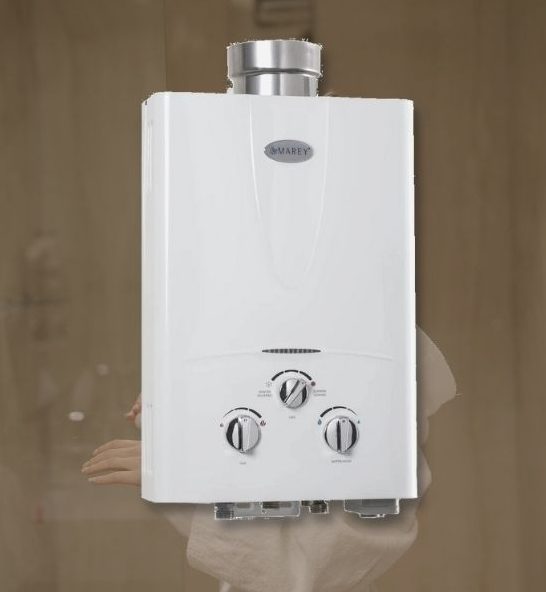
Best battery-powered non-condensing tankless water heater
- Max flow: 3.1 GPM
- Type: Indoor
- Fuel: Liquid Propane/ Natural Gas
- Input: 80,000 BTU
Marey GA10 is a perfect option for regions that suffers frequent power outage or for off-grid and hunting cabins since it doesn’t require any electricity. It only requires a 2D battery for ignition which can be easily available. The non-condensing tankless water heater also works on low water pressure.
With that said, the Marey has a maximum hot water output of 3.2 GPM at a 35°F rise. That means you can operate a single shower or multiple sinks at the same time. The heating capacity of 80K BTU delivers hot water faster and offers an efficiency rate of upto 87%. Marey GA10 equips triple control knob system that allows for temperature, water flow, and gas flow control. The thing I didn’t like about this water heater or you can say a drawback of a non-electric heater is that there is no digital display and temperature control is also adjustable to only winter and summer options. No per-degree adjustment is available.
Going by the EnergyGuide, the unit costs roughly $542 in energy cost. It’s perfect for a small family of 1-2 members.
Pros
- Cheaper price
- Requires no electricity so it’s perfect for the region with power issues
- Ideal for small families and hunting cabins
Cons
- In my test, I have found that temperature fluctuates sometimes
- No digital display and precise temperature control
- High activation flow rate
If the gas is expensive or not available in your area then a tankless electric water heater is a smart choice.
What is a non-condensing tankless water heater?
A non-condensing tankless water heater is a gas-powered tankless water heater(NG/LP) that releases hot exhaust gases directly into the atmosphere. In the form of expelled hot gas, part of the energy is also wasted into the atmosphere and thus non-condensing tankless water heaters are not the most efficient tankless water heaters. Non-condensing tankless water heaters are cheaper since they are less complicated but require an expensive steel venting system.
Should I buy a condensing or non-condensing tankless water heater?
A condensing tankless water heater is more energy-efficient as it uses the energy of exhaust hot gases to preheat the water. These are at least 90% energy-efficient and also do not require expensive steel venting systems. You can use cheaper PVC venting.
However, the condensing tankless water heater can be twice as expensive as the non-condensing counterpart.
A non-condensing tankless water heater, as mentioned above wastes part of the energy in the form of hot gases which makes it less than 85% efficient. Due to the hot nature of the gas, the venting also needs to be of steel which gets expensive.
So if you want high efficiency and savings in the long run then you should go with a condensing tankless water heater. Or if you are on a low budget then a non-condensing model works just fine.

